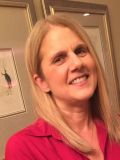
The signs of a problem were all apparent – slurred speech, difficulty finding words and doing simple math, having blurred vision and increasing headaches. I ignored them because I was holding down a full-time job, going to graduate school to become a psychiatric nurse practitioner, and maintaining a household with my husband and two dogs. It wasn’t until I was rushed to the emergency room that the diagnosis of “meningioma” all became real.
According to the American Brain Tumor Association (2017),* it is thought that meningiomas are a kind of brain tumor that develop from three very thin layers of tissue that cover the brain and spinal cord. These layers grow inward, causing pressure on the brain, and meningiomas are generally very slow growing. It is important to note that in my case, a CT scan prescribed seven years prior to my first surgery (craniotomy) did not reveal any abnormalities. *American Brain Tumor Association, (2017). Meningioma. Retrieved from http://www.abta.org.
My symptoms all finally made sense now. Ignoring them for months was a mistake. Why do we, as women, pass off our bodies’ signals that there is something wrong? I can’t help but wonder if I had been diagnosed earlier, the outcome could have been far different.
The tumor measured 4.4x5.9x5.8 centimeters, which equates to the size of a small orange or tennis ball. It was centered at the left frontal lobe, with a four-millimeter shift of midline structure to the right. What this means is the tumor was pushing the left side of my brain into the right side, which, if not removed, would have eventually killed me. The surgical invasion of this area of the brain ultimately caused slurred speech, difficulty in finding and expressing words, trouble doing simple math, increased occurrence of headaches, and other issues. The mass was completely removed, but I was left with right-sided paralysis, severe aphasia, and cognitive impairment. I was discharged to a rehabilitation facility where I regained my ability to walk and began minimal use of my right hand. There was significant improvement in my aphasia, and the weakness I was experiencing was diminishing.
My ability to speak was gone. What I wanted to say was in my head, but what came out of my mouth was unintelligible. After only a few days in the hospital, I was able to speak a few words clearly. Within a week, I was making remarkable progress in my speech. I was able to walk, although my foot dragged and I still had full paralysis of my right hand. When I left the hospital, I had the highest hope that I would regain full speech and physical strength.
Within a few weeks of returning back home, I suddenly awoke one night, gasping for breath. I started shaking so badly that I fell off the bed. The right side of my body was completely paralyzed, and I couldn’t stop drooling. The door to my bedroom was closed. I tried to call for help but no words could come out of my mouth, just babbling noises. I managed to lean up against the wall and open the bedroom door. My husband was asleep in another room at the time, and I managed to knock on his door with my left hand. He screamed, “What’s happening?!” I attempted to write on a piece of paper the word, “seize.” In a few minutes I was in an ambulance being rushed to the emergency room. Their diagnosis this visit was a focal seizure, meaning there was no loss of consciousness.
About a week after discharge, I noticed my face, breasts, and torso were filling up with fluid. I could not walk because my feet were in so much pain. My husband noticed that the incision on my head was swollen, red, and hot to the touch. I was readmitted to the hospital because of a post-operative infection.
Another invasive surgery was performed. A bone flap (significant piece of my skull bone) had to be removed to wash out the infection in the brain. My own flap had been penetrated by the infection and could not be replaced, which left me with nothing covering my brain except for my scalp in that area. An implant would be necessary to cover and protect the brain. It would take eight months for the brain swelling to reduce enough before that surgery could be performed. My recovery was further complicated. Again, I suffered right-sided paralysis, severe aphasia, and total inability to speak. With my cognitive impairment, I could not remember things or learn anything new. I couldn’t concentrate or make decisions, nor could I read, write, or do simple math. This Nurse Practitioner couldn’t even remember how to make a grilled cheese sandwich…or any sandwich for that matter.
After the second surgery, I was further traumatized by a grand mal seizure, which causes the loss of consciousness and the ability to control bodily functions. My whole body seized; I stopped breathing. As I lay there on the floor, I could only drool. I couldn’t speak. My husband kept asking me if I was OK. I could only blink my eyes to show him I was alive. My husband called 911, and I had another trip to the emergency room.
The third, and final surgery, was conducted to reopen the previous incision site again; this time for a custom cranial implant. It was then noticed by the medical team that I had worsening aphasia, right-sided paralysis, apraxia of speech, and cognitive impairment. Nobody said it would be easy, and yet, nobody could fathom that it would be so hard.
Eight months post-op, I found that my aphasia, paralysis of my right side, and difficulty connecting speech messages from my brain to my mouth (apraxia of speech) were all getting worse. Essentially, I was back to square one with the added diagnosis of apraxia of speech. All the gains made in the prior eight months were completely gone.
The road to recovery is a long one. Several areas have to be addressed. Rehabilitation consists of many therapies--speech, physical, occupational, and psychological which I utilized faithfully. I began learning how to speak, read, write, do math, and work with my dominant, paralyzed hand again.
Certainly medication is an important therapy. The regimen is demanding and the side effects are very toxic. To name a few: the feeling of skin crawling, nausea, hot prickly feet, lethargy, and sleepiness. A sense of exhaustion continues to overtake me. Energy wanes to the point of preventing me from doing even the simplest of things. The sense of aloneness is unbearable at times. However, having too many people in my presence for any length of time, and the effort to socialize, is extremely stressful and exhausting in itself.
My greatest fear, like no other fear, was having to wean off one of the two anti-seizure medications. It became a security blanket, protecting and preventing me from having another seizure. If I solely focused on my deficits, it would take me down to the deepest depths, and it would be a steep and difficult climb back up. There were no magic words of wisdom to ease those fears. Negative thoughts just bring negative results, so I prayed a lot and walked through my fear every step of the way.
Eventually, weaning off most medications occurred, very slowly, one prescription at a time, because each drug has its own half-life (the time required to completely leave the body). Fortunately, day-by-day, you begin to feel better!
It’s been two and half arduous years since the diagnosis, but I am accepting my new “normal”. What is that, really? It’s like having been in the deep, dark, muck of a desolate pond and agonizingly, slowly, ascending into sunlight and fresh air to unfold and blossom into a beautiful lotus flower--enlightenment!
I fully realize my accomplishments; one of the most amazing was passing my boards and attaining my certification with a brain tumor. Who does that?!!! My greatest accomplishment is letting go of my old life and aspiring to fully accept a new normal--a beautiful, triumphant, and glorious self. I know what I can no longer do, and I look forward to learning how much more I can do in my new life!
My spiritual life grew a thousand times as I had plenty of time for reflection, something I could not afford in my previous life. To walk in faith is to walk through one’s fears, and trust in a higher power, something greater than ourselves, the God who is within us. I concluded all paths lead to God. Trust was shattered for me as a little girl, but my trust has been rebuilt over the past two years. I consider this to be one monumental success that came from my traumatizing experience.
It seems we take for granted the gifts of being able to speak, write, read, and walk. If we trust in our faith, the greatest therapy of all, strength somehow surfaces to empower us to face the next day with dignity and purpose.
Emotions have run high and low because of the area of the brain that was affected. Depression sometimes ensues with incessant crying. There are still lapses in memory, ongoing cognitive impairment, and apraxia of speech, with continued partial paralysis of my dominant hand. With all the intensive therapies, support from family and friends, and major reflection, I’ve learned that these are not defects in my character. I am not a “stupid woman,” despite my initial thought processes surrounding my new situation. Unfortunately, many unknowing people often label a person with any impairment as less intelligent, stupid, and other various negative descriptions. Wouldn’t it be nice if society could slow down and pay attention to my preamble, “I had a brain tumor, so could you please be patient with me?” I suppose this would only happen in a perfect world.
After two and half years of being mostly homebound, many friends seem to have fallen away. It seems they have lost interest in me and it makes me feel as though I have nothing to offer. I know, if I can count my true friends on one hand, I am rich. I now know who my true friends are, and I am very rich.
Finally, I can offer a much more enlightened version of “Barbara.” The “old Barbara” had to die so a new and improved Barbara could be reborn. She is a courageous, fearless, fighter who is loving and caring. If we really pay attention, we can overcome any obstacle. I never thought my life would have taken me on this path. Wake up and smell the roses everyone! As a wise, old woman once said to me, “Life is a four-letter word.” So, if you are reading this, please give yourself a chance to live your life. It is a gift to wake up every morning and greet the new day with a smile!
- Barbara Lillibridge, PMHNP-BC

